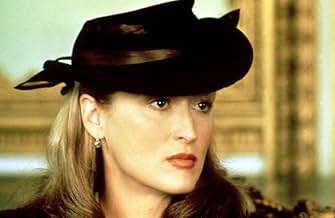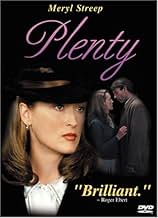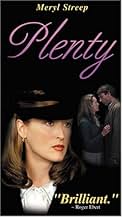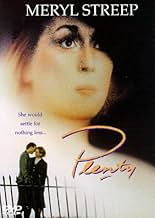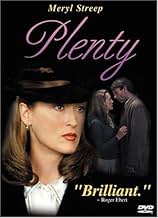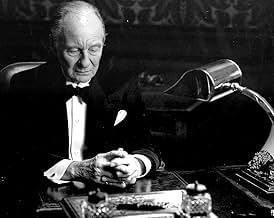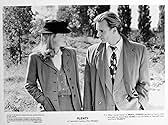NOTE IMDb
6,0/10
3,5 k
MA NOTE
Une jeune Anglaise passe vingt ans à se construire une vie, aux dépens de son entourage, dans l'Angleterre de l'après-guerre.Une jeune Anglaise passe vingt ans à se construire une vie, aux dépens de son entourage, dans l'Angleterre de l'après-guerre.Une jeune Anglaise passe vingt ans à se construire une vie, aux dépens de son entourage, dans l'Angleterre de l'après-guerre.
- Nomination aux 2 BAFTA Awards
- 2 victoires et 5 nominations au total
André Maranne
- Villon
- (as Andre Maranne)
Avis à la une
There is now and has been since 1985 a lot of conjecture as to what this film is about. The reaction I had after I first saw this film was one of the first times I was genuinely depressed after I had seen a film. Depressed by an outside force not from within myself. Women in my family were of the similar age Meryl Streep's character of Susan Traherne...so I asked them how they felt during the war and after. Their candid replies (not prompted by any film discussion either) led me to believe PLENTY was a state of mind, a post war feeling of "winner's feast after survival"...I came quickly to realize Susan Traherne, her men, her lovers, her descent into disillusionment, unhappiness, into madness, irrationality. the realization she had to live with herself and her gauche cruelty, snobbery, foolishness and self deceit... was about Great Britain herself, Susan is the Nation, Brittania. PLENTY is possibly the saddest film I have ever seen, on par with MILLION DOLLAR BABY but for different reasons. I also think Susan represents the women baby boomers in every country had as their Mother, who after taking a deep sunny breath of freedom after struggle found that their family and suburbia was a prison and that post war servitude and struggle was the hell they never reckoned with. PLENTY is a great title for this film of 'the promised land" that turned into a supermarket car park. I never want to see it again. Such is the heartbreaking success of this production. PLENTY is a major achievement in film making and it's emotional reality is absolutely crushing.... like Susan's soul and promise was crushed by post war plainness. THE HOURS goes into the same territory in the 1950s sequences with Julieanne Moore wanting to suicide. Susan's sex scene during the Queen's coronation is the cruelest, most superb observation of the relationship between the Royal family and Britain. PLENTY is a character study and not a popcorn movie. Not all films are 'flicks' as some people demand they be. THE FIGHT CLUB and the effect on 30 year old men of today of the pressures commercial modern living as personified by Ed Norton in his famous "ikea" speech is a good equivalent for today's crushed male soul.
David Hare's brilliant stage play has been translated beautifully to the screen. The peculiar English trait of natural melancholy radiates throughout this sad exercise of seeing all through the lens of British class consciousness, repression and despair. The color photography, the performances, the stifling framing of the widescreen shots all add to the oppressive beauty of a story about the self-destruction of a preternaturally beautiful woman. Mery Streep has never been better before or since. Hare makes her intellectual acuity a weapon against herself as she sees through all the ghastly pretenses of a corroding Empire. No insight, no beauty of body, no letting go of formality and pretense can save her from herself. Feminism itself is taken to the burning stake as Streep's character thrashes, Hedda Gabbler like, against walls and prohibitions beyond her understanding. Rarely has such condemnation looked so ravishing.
This is a film where you can get lost, wonderfully lost. Following Susan, the character created on the page by David Hare and on the screen by Meryl Streep, is a journey of gloriously unexpected ups and downs. It may be because the amazing Meryl Streep goes trough the analytic intellect of David Hare with her heart on her sleeve and I felt shattered and moved by the access she provided me into the heart and soul of her own personal labyrinth. To look back with regret and feel that memories of fleeting moments of extraordinary beauty can keep you going and see you through whatever hell fate seems determined to throw your way. Meryl Streep never looked this beautiful and the transparency of her missteps are a magic sweep of the most enthralling kind. Irrationaly sane. Like most of the great bipolar. They know, they've seen through. There is nothing ahead only behind and now it's too bloody late. The stages of Susan's journey, to the after war lands of plenty are framed by her own geniality - the character's and the actress's - Susan is overwhelmed by her own awareness, lonelier and lonelier, Meryl overwhelm us with her own sublime generosity. Fred Schepsi, the extraordinary man at the helm, keeps the puzzle open and clear. Like most works of art, not everyone will be ready to open up to this experience. Pretty frustrating let me tell you. I would love to share this experience with everyone.
This much-overlooked British drama opens with, literally fades in on, her days in WWII France. It follows her through the next 15 or 20 years, and ends with an aching scene from a past day when she thought tomorrow seizes nothing but good things for her. But nothing else in her life is ever as valuable, as dignifying or as exciting as the war. She is, maybe, a little insane. She divulges in one scene that she has a considerable issue: "Sometimes I like to lose control."
Fred Schepisi's obscure film stars Meryl Streep and it is a performance of daring delicacy. It is hard to play an irrational, maladjusted, quasi-suicidal woman with such tenderness or grace. She is oftentimes quite charming to be around for the other characters, and when she is letting herself fall short of restraint, she doesn't do it in the vein of those exclusive movie frenzy scenes but with a relatively pleasant imperativeness.
When she returns to England after the war, she makes friends with a round-faced, grinning imp played by a refreshing Tracey Ullmann. Another is Charles Dance's foreign service officer who is initially charmed by her casual, free-spirited lifestyle, and then marries her and becomes her permanent aggrandizer, putting up a barricade of composure and practically divine patience around her tantrums.
It is challenging to pigeonhole specifically what it is that disturbs Streep's character. Early on, David Hare's screenplay shepherds us to her own heuristic that after the valor and brazenness of the war, after the gallantry and the passion, it is beyond absurd to her to readjust back to normal life and endure the tedious small talk of civil commonality. Yet as the film proceeds in a clandestine manner of being episodic, we find there is something persistent, a little vicious, in the way she humiliates her husband at crucial times, constantly seeking to be tactless and incongruous. Ultimately, we gravitate toward his position when he eventually thunders that she is hateful and pitiless, and oblivious to those who have withstood her.
But then there is an postlude, moistened by the misty twilight of the most dismal hour of fall, and there is such despondence in the way she and another character both become conscious that nothing will ever graze them again the way the war did. This bit part-filled movie is conclusively not a assertion concerning war, or foreign service, or middle-class British, but just the story of this lost woman who at one time lived profoundly, and now finds that she is barely even living.
The performances grant one enthralling solitaire after another. Most of the pivotal instances come as different characters eclipse different scenes. Streep births a complete character around a woman who could have merely been a hit list of problems. Charles Dance has an unrewarding part, as her perpetually agonized husband who from the beginning seems like a very dull bureaucrat, but survives to show that he is respectable as well as foolish. Sting plays a commonplace young man who ineffectively tries to conceive Streep's child for her. John Gielgud has three small scenes and steals them all, which essentially is the story of his career. Plenty is written, acted and directed as a lather of refinement and delicate shrewdness, underneath which grows the revelation that life can often be futile, dull and depressing, and that there can be days, months, years, decades in accordance.
Fred Schepisi's obscure film stars Meryl Streep and it is a performance of daring delicacy. It is hard to play an irrational, maladjusted, quasi-suicidal woman with such tenderness or grace. She is oftentimes quite charming to be around for the other characters, and when she is letting herself fall short of restraint, she doesn't do it in the vein of those exclusive movie frenzy scenes but with a relatively pleasant imperativeness.
When she returns to England after the war, she makes friends with a round-faced, grinning imp played by a refreshing Tracey Ullmann. Another is Charles Dance's foreign service officer who is initially charmed by her casual, free-spirited lifestyle, and then marries her and becomes her permanent aggrandizer, putting up a barricade of composure and practically divine patience around her tantrums.
It is challenging to pigeonhole specifically what it is that disturbs Streep's character. Early on, David Hare's screenplay shepherds us to her own heuristic that after the valor and brazenness of the war, after the gallantry and the passion, it is beyond absurd to her to readjust back to normal life and endure the tedious small talk of civil commonality. Yet as the film proceeds in a clandestine manner of being episodic, we find there is something persistent, a little vicious, in the way she humiliates her husband at crucial times, constantly seeking to be tactless and incongruous. Ultimately, we gravitate toward his position when he eventually thunders that she is hateful and pitiless, and oblivious to those who have withstood her.
But then there is an postlude, moistened by the misty twilight of the most dismal hour of fall, and there is such despondence in the way she and another character both become conscious that nothing will ever graze them again the way the war did. This bit part-filled movie is conclusively not a assertion concerning war, or foreign service, or middle-class British, but just the story of this lost woman who at one time lived profoundly, and now finds that she is barely even living.
The performances grant one enthralling solitaire after another. Most of the pivotal instances come as different characters eclipse different scenes. Streep births a complete character around a woman who could have merely been a hit list of problems. Charles Dance has an unrewarding part, as her perpetually agonized husband who from the beginning seems like a very dull bureaucrat, but survives to show that he is respectable as well as foolish. Sting plays a commonplace young man who ineffectively tries to conceive Streep's child for her. John Gielgud has three small scenes and steals them all, which essentially is the story of his career. Plenty is written, acted and directed as a lather of refinement and delicate shrewdness, underneath which grows the revelation that life can often be futile, dull and depressing, and that there can be days, months, years, decades in accordance.
I was moved by this film. I was aware of Kate Nelligan's performance as Susan Traherne in the original stage version, a lusty, glowing former Resistance heroine with a shattered psyche. In the film, Meryl Streep focused on a beautiful, disarming character's inconsistent control of the crazy energy lurking underneath.
Plenty could be re-released today on a double bill with the recently released Brothers. Both show the long-term effects of war, fought overtly and covertly, on combatants and those who love them. It is no secret that the soldier in Brothers wreaks havoc on his family after returning from one tour of duty too many in Iraq. "People with PTSD have persistent frightening thoughts and memories of their ordeal and feel emotionally numb, especially with people they were once close to."
So, one way to view and appreciate Susan Traherne and her effect on her husband, friends and co-workers is from this perspective within the context of their cultures.
Plenty could be re-released today on a double bill with the recently released Brothers. Both show the long-term effects of war, fought overtly and covertly, on combatants and those who love them. It is no secret that the soldier in Brothers wreaks havoc on his family after returning from one tour of duty too many in Iraq. "People with PTSD have persistent frightening thoughts and memories of their ordeal and feel emotionally numb, especially with people they were once close to."
So, one way to view and appreciate Susan Traherne and her effect on her husband, friends and co-workers is from this perspective within the context of their cultures.
Le saviez-vous
- AnecdotesThe original Broadway production of "Plenty" by David Hare opened at the Plymouth Theater in New York City on January 6, 1983, and ran for ninety-two performances until it closed on March 27, 1983. The play was nominated for four Tony Awards in 1983, including Best Play. Also, the play won the New York Drama Critics' Circle Award for Best Foreign Play of the 1982 to 1983 season.
- GaffesQueen Elizabeth II's coronation was in 1953, yet the flag display in the background includes the Canadian "maple leaf" flag which was not adopted until 1965.
- Citations
Susan Traherne: I would stop, I would stop, I would stop fucking talking if I ever heard anybody else say anything worth fucking stopping talking for!
- ConnexionsFeatured in At the Movies: Crossover Dreams/Maxie/Mishima/Plenty (1985)
Meilleurs choix
Connectez-vous pour évaluer et suivre la liste de favoris afin de recevoir des recommandations personnalisées
- How long is Plenty?Alimenté par Alexa
Détails
- Date de sortie
- Pays d’origine
- Langue
- Aussi connu sous le nom de
- Eine demanzipierte Frau
- Lieux de tournage
- Sociétés de production
- Voir plus de crédits d'entreprise sur IMDbPro
Box-office
- Budget
- 10 000 000 $US (estimé)
- Montant brut aux États-Unis et au Canada
- 6 148 000 $US
- Week-end de sortie aux États-Unis et au Canada
- 436 266 $US
- 22 sept. 1985
- Montant brut mondial
- 6 148 000 $US
- Durée2 heures 4 minutes
- Couleur
- Mixage
- Rapport de forme
- 2.35 : 1
Contribuer à cette page
Suggérer une modification ou ajouter du contenu manquant



